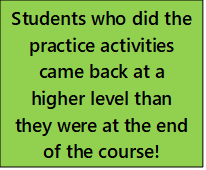1. Find your way in English
2. Listen to your reading
Don’t worry if you mispronounce a word here and there. Just give it a try and move on. When you hear someone else say the word, it will ring a bell in your mind, and you will know the right pronunciation. You don’t have time to read? Use the time you already spend reading: social media posts, work e-mails in English, news stories, or your company’s press releases. Read aloud daily in English and see the difference it makes! 3. Sing along
4. Check your phone
5. LinkBook your TwittaGram in English
So that’s it. Five easy things you can do to improve your English. Try them all right away, or just start with one or two. The important thing is to start. The sooner you start, the sooner you’ll improve. What everyday activities do you do in English?
Post them in the comments section below!
2 Comments
 Hello, and welcome! I’m Krisia Justesen, I started Forefront Language Solutions to help you improve your English quickly and easily. This is my first blog post, so I’m going to tell you a little about why I started Forefront and what you can expect to see here on this blog. If you want to find out more about me, check out the About section of the site. Does it sound like too much to read at once? Scroll down and skip to the part you’re interested in: The story behind Forefront Language Solutions About the Blog How to stay connected The Forefront Story When I started teaching English almost 15 years ago, I did it the same way everyone else did, the way I was trained: with textbooks, exercises, grammar instruction, dictionaries, and homework. It seemed logical, that’s how we learn other subjects, right? In my first couple of years as a teacher, I realised that my students were learning English grammar, vocabulary, phrases, spelling, and pronunciation, but they still didn’t have any confidence when they needed to speak, especially at work. I started looking for alternatives, and found an immersion course, where clients came for only five days, from 9:00 a.m. to 6:00 p.m., and that’s it! I had a lot of fun in that classroom (which was more like a living/dining room than a traditional classroom), and so did my students. The most important thing was that after five days, no matter what level the students were at, they were chatting together happily in English, and after the course they would go out and look for opportunities to use English. I realized that we have to look at English not as a subject like math or history, but as a skill like driving a car, or cooking. You can read about it a bit, but you’re not going to get good at it unless you actually do it. At the same time, I began to notice that my students improved a lot over the five days of the course, but if they came back two months later, they were back to the same level that they originally started from. This was unacceptable to me! I started to look for ways that they could maintain their finishing level indefinitely.  I needed to find something they could do that didn’t require a teacher or someone who could help them (because most of the students didn’t have access to someone else who spoke English well), that didn’t cost anything (they were already paying a lot for the course), and that didn’t take too much of their time. After some research and experimentation, I came up with four practice activities for them to do at home. Each activity needs to be done for just five minutes a day, and they don’t have to be at the same time. I started to notice that students who did the practice activities regularly not only maintained their level, but also came back at a higher level than they had been at the end of the previous course! Over the following 13 or so years, and with hundreds of students in Turkey and Denmark, I refined and improved these four practice activities, and this is what I now offer as the Forefront Learning System. In the past 8 years working as a freelance teacher for various agencies in Denmark, I’ve come to realise that there is often a gap between what they offer and what business students need. I started Forefront Language Solutions in 2019 as a way to offer flexible solutions to business people who want to learn English. If you need someone who can help you fix what is wrong with your English so you can do your job better, I can help you. If you want to be able to talk about your specific job, sector, or industry in English, I can help. If you want to practice that presentation you have to make for a big meeting, that’s what I do. If you have an important phone call and need to make sure you are ready for it, I can coach you. If a department in your company needs a workshop to improve how they communicate with clients, I can prepare and present that workshop, and make sure that all attendees improve. I work with you to provide the type of instruction you need, in the right size group, at a convenient time, at a fair price. In addition to consulting and teaching services, Forefront can proofread and copy edit your documents, presentations, e-mails, brochures, blog posts, and even spoken presentations. You’ll get corrections, and tips for improving them, and if you like, I can give you a follow-up lesson in person, or with live video chat, to help with the areas you need to improve. You will be able to learn the practice techniques I developed, so that in just 20 minutes a day (four five-minute practice activities), you can improve your English, increase your accuracy and fluency, correct your pronunciation, and become more confident using English. I’ve also built an web application that will help you to track your practice, see where you need to do more, and look back and assess your progress. It will also help me to see your progress if you want private coaching. For me, Forefront Language Solutions is not just a business. It’s a chance for me to share my passion for teaching English with the people who want and need to speak better English. Forefront Language Solutions is also a way for me to connect with and enhance my community. I provide scholarships for classes and workshops to job-seekers and people in need in the Aarhus community. If you know of someone who could benefit from this, contact me at [email protected]. ForeWords: The Blog  I hated learning languages in school. I was bad at it, and it didn’t seem to work for me. Perhaps you are one of the many out there who hate learning English. But in today’s world, English is often the key to getting ahead at work, and many people need English to do their job well. If you have tried the traditional methods of learning and still feel that it isn’t enough, this blog is for you. If you don’t have time for the amount of lessons you think you need to get your English to a good level, then this is the place for you. Here in this blog, I’m going to give you tips and advice on how you can help yourself to improve your English. I hope you'll find some interesting and fun ideas you haven't tried before. You speak your first language perfectly, so I know you can learn to speak English well! As time goes by, ForeWords will become a treasure chest of information about improving your English. Connect with Forefront Language Solutions on Facebook or LinkedIn to get notifications when there are new posts. …it goes both ways… Each blog post has a space for comments. Share how things are going for you. There is also a Forefront Language Solutions Facebook page, and a Forefront Language Group on Facebook, where you can talk to me and other students and get advice and encouragement on improving your English. If you have any suggestions or complaints, you can e-mail me at [email protected] Like and follow Forefront Language Solutions on Facebook to keep updated on new blog posts. What are some problems you have with learning English? Put them in the comments below, and I'll address them in future blog posts!
|
AuthorKrisia is an English teacher, wife, mother of two, and founder of Forefront Language Solutions. See more here. ArchivesCategories |
|
Language Consulting v/Krisia Dawn Justesen
Teglmarken 51 8800 Viborg CVR: 36 29 61 86 [email protected] [email protected] |








 RSS Feed
RSS Feed
